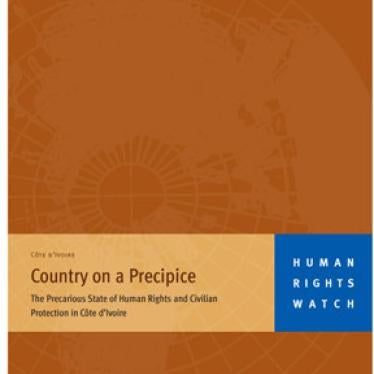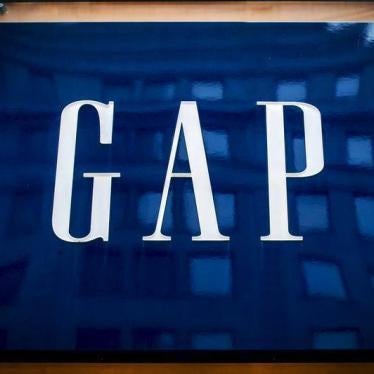(New York) — In Côte d’Ivoire’s fragile peace process, further attacks against civilians could set off a sudden spiral of human rights abuses that would be difficult to control, Human Rights Watch said in a report released today. On May 4, the U.N. Security Council will discuss extending the mandate of the U.N. peacekeeping mission in the country.
Human Rights Watch called on the Security Council to increase the number of international peacekeepers, particularly in the event that the latest peace deal, signed April 6 in Pretoria between the Ivorian government and rebel groups, breaks down and hostilities resume. The Security Council should also enforce sanctions against those responsible for grave human rights abuses.
The 35-page report, “Country on a Precipice: The Precarious State of Human Rights and Civilian Protection in Côte d’Ivoire,” documents recent military incidents that demonstrate the precariousness of the situation in Côte d’Ivoire. The report also shows how the continued proliferation of militias and the government’s practice of using hate speech to incite violence puts civilians at continued risk.
“There are high hopes that the latest peace accord will bring about improvements in human rights in Côte d’Ivoire,” said Peter Takirambudde, Africa director at Human Rights Watch. “But if the Pretoria agreement fails, as have earlier efforts, conditions could quickly become disastrous for civilians.”
The report examines the government offensive against the rebel-held north in November, which was followed by widespread anti-French riots in Abidjan and ethnic clashes in Gagnoa. It also details how the February 28 attack by government-backed militia on the rebel-held town of Logouale sparked ethnically motivated attacks between indigenous groups and immigrant farm workers that resulted in some 16 deaths, caused more than 13,000 villagers to flee, and left several villages in flames.
Human Rights Watch found that government forces in the first three months of the year were training and equipping militia forces, including Liberian mercenaries, to renew the war against the rebel New Forces (Forces Nouvelles). The government has been making increasing use of thousands of poorly-trained and ill-disciplined militias that have committed serious crimes with impunity, particularly targeting northerners, Muslims and West African immigrants. The report also notes recent abuses committed by the New Forces rebels against perceived government opponents, including torture and summary execution.
Human Rights Watch called on the U.N. Security Council to significantly improve the prospects for civilian protection in Côte d’Ivoire. First, the Security Council should approve and deploy additional troops to the U.N. peacekeeping mission in Côte d’Ivoire (UNOCI). Second, it should implement economic and travel sanctions against individuals responsible for serious violations of human rights or who “incite publicly hatred and violence,” as authorized on November 15, 2004 under Security Council resolution 1572. Third, in the event that the situation in Côte d’Ivoire deteriorates, the Security Council should authorize UNOCI to make preparations to block transmissions of hate speech intended to incite violence against civilian populations.
A United Nations force of some 6,000 peacekeeping troops and 4,000 more heavily armed French troops patrols a buffer zone between the rebel-held north and government-controlled south of the country. In a U.N. report in December 2004, Secretary-General Kofi Annan said this is too small a force to ensure peacekeeping and civilian protection and asked for 1,200 additional troops and equipment, but in the Security Council, the request has run into opposition from the United States on budgetary grounds.
“The attacks on civilians that followed the recent fighting illustrate the challenges facing the overstretched peacekeepers,” said Takirambudde. “The blue helmets are too thinly spread and lightly equipped to deal with multiple attacks accompanied by civil unrest or communal violence. The Security Council must approve the reinforcements without delay.”
Human Rights Watch noted that one result of the series of failed peace initiatives in Côte d’Ivoire has been the international community’s reluctance to impose targeted sanctions or encourage criminal prosecution against political and military leaders from all sides accused of war crimes. Such measures have been put on hold due to concern that they would undermine efforts to end the political and military stalemate.
Human Rights Watch called on the prosecutor of the International Criminal Court to lay the groundwork for an investigation into war crimes by all sides to the Ivorian armed conflict. The ICC prosecutor, acting on a request by the Ivorian government in September 2003 to bring the rebels to justice, said in January that he would send a team to Côte d’Ivoire. This investigation should be carried out with a view to prosecution of those suspected of violations of human rights and international humanitarian law by government forces, government-backed militias and rebel forces.
“The logic of putting justice on hold for an elusive final settlement denies victims the right to see those responsible for serious human rights crimes held accountable.” said Takirambudde. “Instead, this strategy appears to be emboldening perpetrators in Côte d’Ivoire.”
Background
The military junta of 1999-2000 and the armed conflict between the government and northern-based rebels in 2002-2003 have been punctuated by atrocities by both government and rebel forces, including political killings, massacres, “disappearances” and torture. The widespread impunity from prosecution enjoyed by all armed forces, but especially pro-government militias, has resulted in ever-increasing incidents of violence against civilians. The political and social climate has become increasingly polarized and characterized by intolerance, xenophobia, and suspicion, bringing fears of what could happen should there be an all-out resumption of hostilities.
Mediation efforts by South African President Thabo Mbeki led to the signing of an agreement by all sides on April 6, which effectively committed all forces to disarm and work towards elections in October. Progress in the mediation, which was sponsored by the African Union, had been slow until the Mbeki-led meeting in Pretoria, which was billed as a last ditch attempt to save Côte d’Ivoire from sliding back into full-scale war.
Political observers remain skeptical about the prospects for implementation of the African Union-led initiative signed in Pretoria, given that two previous peace accords — Linas-Marcoussis in January 2003 and Accra III in July 2004 — never got off the ground. Gbagbo’s willingness to abide by Mbeki’s proposal to open up the field of candidates, and thereby include his key political rival, remains the most central issue standing between the prospects for an end to the war and a resumption of hostilities.






